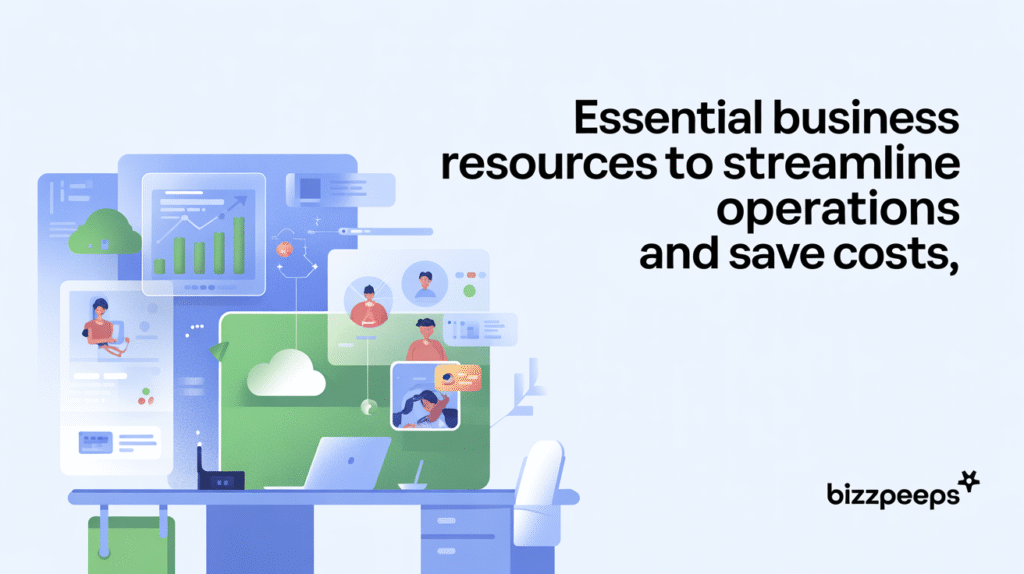Launching a startup in 2025 has its thrills, trouble and making decisions. Entrepreneurs have to work in very competitive markets, rapidly changing consumer requirements, and low budgets. Investors are usually wary and financial resources are scarce so startups must work smarter, rather than harder. Luckily, the digital age has enabled business owners to gain access to excellent quality tools and services without spending a penny. The following free business tools help startups to carry out project management, coordinate communication, manage finances, market successfully, and develop long-term customer relations without putting stressful pressure on their budgets.
In this detailed post we will discuss 10 best free business resources that every startup should have in 2025. All the tools will be described and explained, what it is able to do, why it is useful to startups, and how to use it to your advantage. By the end, you will have an effective plan on how to equip your business with the vital resources that enable you to compete with greater confidence with even bigger companies even the ones that are established in the market.
What Are Business Resources and Why Do They Matter?
Business resources are tools, platforms and services that are intended to make it more effective and manageable. They include project management applications and productivity suites, financial software, design platforms, customer relationship management systems. Using these resources, startups can be professional, more productive and maximize budgets that are always tight.
The Role of Business Resources in Startup Success
The reason why startups fail is generally not the bad idea, but the inefficiency of the operations. Entrepreneurs take on several roles-sale, marketing, operation and finance. Business resources are silent partners, who make all the processes easier and save time. They automate the processes where people have to do the same thing over and over again, enhance communication, and provide information that founders can use when making their decisions more informed.
Why They Matter for Startups in 2025
The year 2025 presents unique challenges. Rapid technological advancement, the growth of remote teams, and increasing competition mean startups must remain agile. Free business resources address these needs by providing tools that offer:
- Cost Savings: Accessing advanced platforms without heavy investments.
- Operational Efficiency: Streamlining tasks that would otherwise consume valuable hours.
- Scalability: The ability to upgrade tools as the business grows.
- Competitive Edge: Leveling the playing field by using the same resources as established companies.
- Focus on Growth: Freeing entrepreneurs to prioritize innovation and customer value instead of administrative tasks.
Ultimately, leveraging these essential business tools 2025 can determine whether a startup thrives or struggles to survive.
Top 10 Free Business Resources Every Startup Needs in 2025
1. Trello – Visual Project Management
Trello is one of the most popular business applications among start-up businesses due to its effective and yet basic demeanor in handling business. Trello enables teams to make complex projects manageable by separating them into small tasks with the help of boards, lists and cards. Every task may contain the description, due date, checklists, and attachments.
Trello is very visual, which helps start ups. Small teams tend to have several projects running at the same time, and without sufficient organization they are subject to missing tasks. Using Trello, each member can see what is being done, who is the owner and what is the next step. Its free version is more than sufficient to most startups, and it allows unlimited cards, integrations, and real-time collaboration.
Pro Tip: Combine Trello with Slack or Google drive to unify workflows and save time resulting in frequent switching of applications.
2. Canva – Design Made Simple
Branding is an essential part of the image of a new business and Canva is rapidly becoming a preferred choice as a way to create attractive quality graphics without the need to possess detailed design skills. Entrepreneurs will be able to create their logos, social media images, pitch decks, and any sort of marketing collateral, in a templated format.
To smaller companies with limited resources, Canva provides startup companies with the respectability of professional branding on a budget without needing to pay a professional designer. Having a good brand identity can instill a sense of reliability in the customers and investors, which is why Canva is an essential free tool to businesses.
Pro Tip: Take advantage of the Canva Brand Kit to retain consistency regarding your logo, fonts and colors on all designs.
3. Slack (Free Plan) – Team Communication Reimagined
A rapid-growing startup often does not work well using emails. Slack is a revolutionary tool since it provides an instant accessibility and access to communication in the form of channels, threads, and direct messages. The sharing of files, links, and updates can be done immediately keeping teams on track.
In startups time is of the essence and teamwork is essential. Slack allows you to have 90 days of message history, file sharing, and integrations with such of tools as the Trello and Google Drive at the free plan. This makes it the best option in case of small teams where they are trying to remain agile and responsive.
Pro Tip: Dedicate different channels to projects or departments so you do not get clutter or get up to specific channels.
4. Google Workspace (Free Tools)
Google Workspace includes Gmail, Docs, Sheets, Slides, Meet and Drive at zero cost. Startups are able to attach files, share on and offline, and organize a document editor, virtual meetings, and cloud storage.
The collection of tools has become indispensable to remote-first start-ups. Google Workspace is one of the most convenient small businesses tools as it makes it easier to access any files wherever they are and securely share files. It encompasses almost all the core functions of business, drafting of contracts, analysis and presentation of data.
Pro Tip: With shared Google Drive folders, you can store the most important business files, and everyone will have access to them and be able to share them safely.
5. Asana (Free Plan) – Task Management
Asana is the way to go when it comes to established task organisation whereas Trello excels at being a visual process organiser. The free solution provides the creation of tasks, due dates, assignments, and timeline view, so it is simple to follow long-term objectives.
Small companies should pick up accountability. Asana helps to ensure that deadlines are transparent, tasks are transparent and projects run smoothly. To simple such as product launches or even campaign planning the timeline view is particularly useful.
Pro Tip: Take advantage of recurring tasks in Asana, as a way to put a routine process or activity on autopilot.
6. Mailchimp (Free Plan) – Email Marketing Made Easy
So far, email marketing is still one of the most powerful means of startups. Mailchimp is an email design, automation and tracking tool that lets business optimize their email strategies. The free account has a maximum of 500 subscribers and 1000 monthly email sends.
Doing small scale businesses, mailchimp automation capabilities like the welcome emails and abandoned cart reminders are game changers. It assists startups to develop customer relations at minimal cost.
Pro Tip: Separate audience according to behavior or interests to provide more personalized campaigns and increase the engagement.
7. HubSpot CRM (Free)
Scaling is greatly dependent on customer relationship management. HubSpot CRM is a free service that enables startups to manage leads, monitor pipelines and track customer interactions. HubSpot free plan is rich in features and free of scale limitations as compared to many competitors.
By centralizing all customer data, HubSpot avoids the chances of startup losing their leads. It has integrated email tracking and deal management and it features one of the best startup growth tools on the market.
Pro Tip: Analyze results of which sales activities provide the best results using HubSpot analytics.
8. Wave Accounting
Funds may mean the death or life of a start up Wave has no fee structure, invoicing, bookkeeping and tracking expenses features, making it a perfect fit to startup or a small company with little or no accounting background. Its interface is easy to use and reports can run automatically, as well as automatic receipt scanning.
The financial clarity is something that is underestimated by startups. Using Wave, entrepreneurs are able to monitor the expenses, issue professional invoices and manage cash flow without the need to employ accountants.
Pro Tip: You can connect Wave to your business bank account where the transactions will be automatically imported and labelled accordingly.
9. Grammarly (Free Plan) – Writing Assistant
Each email, proposal and blog post are a part of your brand. Grammarly makes your writing sharp, comprehensible and mistake-free. Its free version provides real-time grammar, spelling and tone check in your investor pitch, or the latest features of your web site.
Good communication helps to create credibility in startups. Grammarly takes the hassle out of the proofreading process and can make sure that every piece of message reinforces your credibility.
Pro Tip: With the tone detector on Grammarly, you can adjust the way you write to suit the purpose (being professional, persuasive or casual).
10. Hootsuite (Free Plan) – Social Media Management
Social media is one of the main avenues through which a startup can grow, and Hootsuite allows companies to track multiple accounts using a single dashboard. The free version also enables one to schedule up to two accounts and analyze the numbers.
One thing that will guarantee startups continued visibility through consistent social media presence is Hootsuite as it does not overly burden the schedules of the business owners. It is an essential asset to any entrepreneur who is interested in establishing a good Internet presence.
Pro Tip: Schedule the posts week ahead to have steady flow of posts and concentrate on engagement.
Tips for Choosing the Right Resources
Not every tool will be right for every startup. Choosing wisely ensures you don’t waste time juggling too many platforms.
1. Focus on Immediate Needs
Identify which areas—communication, finance, or marketing—require the most urgent support and prioritize those tools.
2. Avoid Tool Overload
It’s tempting to adopt multiple free tools, but too many can create confusion. Start with the essentials and add more as your business scales.
3. Ensure Integrations Work
Pick resources that integrate seamlessly with others. For example, Slack integrates with Trello, and HubSpot integrates with Gmail, creating smoother workflows.
4. Upgrade Only When Necessary
Stick to free plans until growth demands premium features. Many startups operate successfully for years without upgrading.
5. Plan for Scalability
Select resources that offer upgrade paths so you don’t need to switch platforms as your business grows.
Wind-up
Moving around 2025, it is more evident than ever that a business is not required to have big budgets to start with. However, with all these free business tools, entrepreneurs now have tools equivalent to those of an established business because they have the power to engage people, market, track finances, plan and manage their projects and keep in touch with customers in the ways that established businesses do. Such platforms do not only save on the costs but also improve efficiency enabling the founders to take care of innovation, development, and satisfaction of the customers.
The top 10 resources we talked about; Trello and Asana at task managing, Canva in the sphere of design, Mailchimp at marketing and HubSpot CRM at customer relationships, are the foundations of the contemporary startup toolset. Being versatile, scalable, and widely used by thriving businesses all over the world, they make an infinite number of applications.
In case you are a new entrepreneur or small business owner the trick is not to use an entire palette of tools at a time but to identify those which suit your imminent needs. Start small, master how to get most out of their features and increase scaling only when needed. In such a manner, not only will you save some money but also establish highly effective systems that will guarantee long-time success.
Now go out there and start: Add this guide to your bookmarks, and share with your fellow business owners, and start experimenting with the free resources which suit your purposes. The above-mentioned tools, paired with your vision and perseverance will make your startup the top choice in 2025 and the years to come.
FAQs
Q1. Is free business resources sustainable enough to start ups to grow and survive?
Yes. Free tools can usually handle start up phases of a business just fine. They possess fundamental areas such as project management, accounting, communication, and marketing. As your business expands and you have higher needs later, you can switch to premium account.
Q2. Which free tools will be the majorly-used small business resources in 2025?
The most useful ones are dependent on your targets, but most certainly Trello (project management), Canva (design), Wave (accounting), Mailchimp (email marketing), and HubSpot CRM (customer management) are some of the most useful to start-ups and small business.
Q3. How can I be sure of which tools to focus on as a startup?
Start by selecting the most burning issues you have now As an example, an organization tool such as Trello or Asana would be important to you in the case you are not organized. In case the level of customer engagement is the primary concern, pay attention to Mailchimp or HubSpot CRM. A particular tool should first be matched with the problem you want to be fixed.
Q4. Are these business resources free integrated?
Yes, the greater part of them do. As an example, Trello is compatible with Slack and Google Drive, Mailchimp is connected with HubSpot, Google Workspace can easily connect with mostly all other tools. Integration makes the workflows smooth and does away with manual duplication.
Q5. Do business tools include a cost behind the free cost?
These resources operate on the free plans that cover the basic features of the services startups require with no hidden fee. But as you go along with your startup, you might desire high end features such as advanced analytics, more storage, or automation. The good news is that you can decide on when and whether or not you would like to upgrade..




